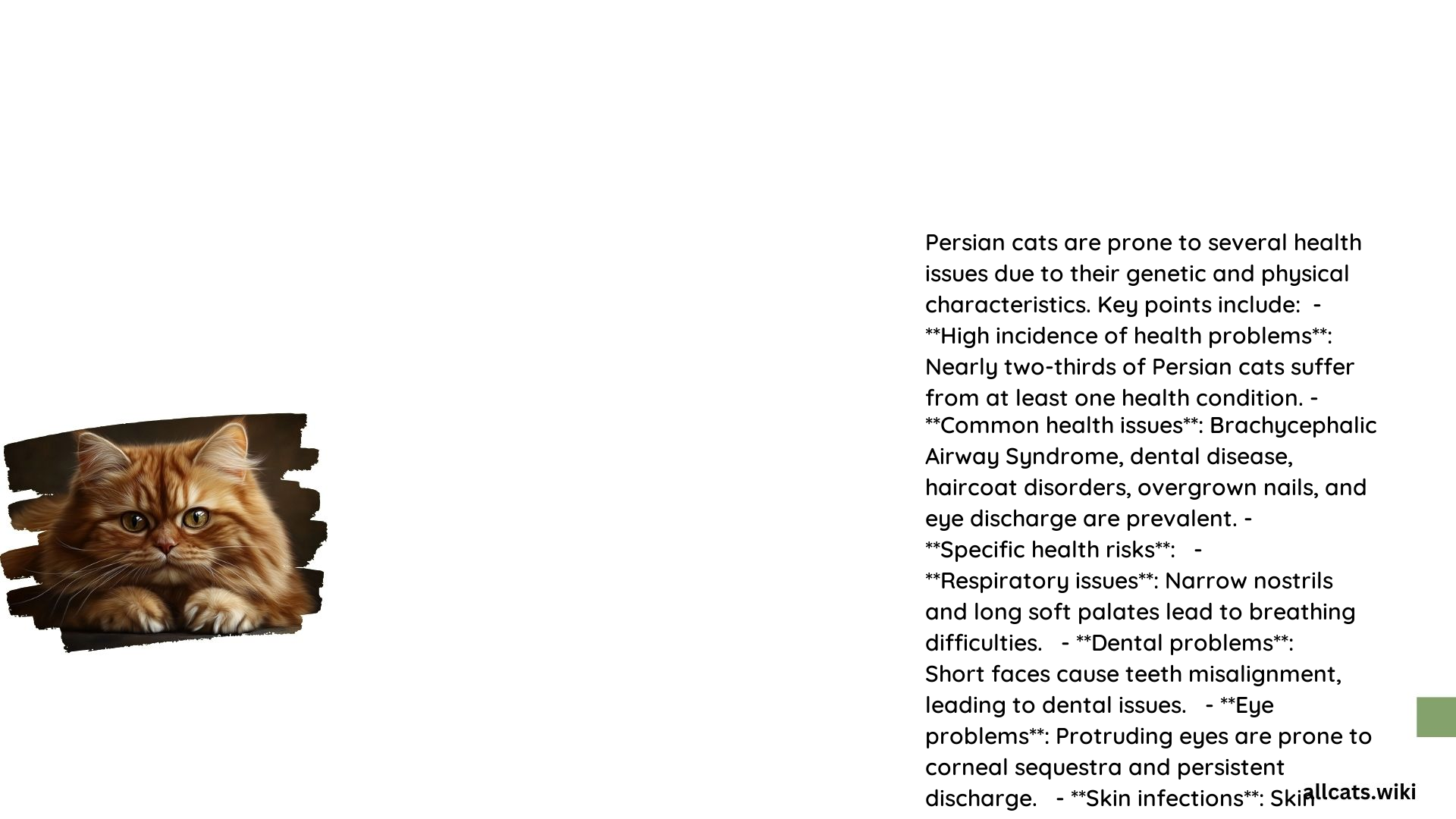Are Persian Cats a Healthy Breed?
Persian cats are known for their distinctive physical characteristics, such as their flat faces, long coats, and large eyes. However, these traits also predispose them to several health issues, making them one of the breeds with significant health concerns.
What Health Issues Do Persian Cats Face?
- Brachycephalic Airway Syndrome
-
Persian cats are prone to this condition due to their flat faces and short noses. It involves narrowed nostrils, an elongated soft palate, and a narrow trachea, leading to breathing difficulties. Symptoms include mouth breathing, noisy breathing, and exercise intolerance.
-
Polycystic Kidney Disease (PKD)
-
PKD is a hereditary condition where multiple cysts form on the kidneys, leading to renal failure over time. Approximately 40% of Persian cats are affected by this disease, which typically manifests around 7 years of age.
-
Dental Disease
-
The short face and misaligned teeth of Persian cats make them prone to dental issues, which can lead to mouth pain, poor appetite, and infections.
-
Eye Problems
-
Persian cats are susceptible to various eye issues, including corneal sequestra, persistent discharge due to malfunctioning tear ducts, and progressive retinal atrophy.
-
Skin and Coat Disorders
-
The long, dense coat of Persian cats requires regular grooming to prevent matting and skin infections. They are also prone to skin folds infections and other skin issues due to their facial structure.
-
Heart Disease
-
Hypertrophic cardiomyopathy (HCM) is a common heart condition in Persian cats, characterized by thickening of the heart muscle, which can lead to heart failure and sudden death.
-
Other Health Issues
- Persian cats are also at risk for hip dysplasia, thromboembolism, and feline lower urinary tract diseases (FLUTD).
What is the Prevalence of Health Conditions in Persian Cats?
- Nearly two-thirds of Persian cats suffer from at least one health condition, indicating a significant welfare concern.
- Around 40% of Persian cats are affected by Polycystic Kidney Disease (PKD).
- Brachycephalic Syndrome is common in Persian cats, with symptoms often worsening over time.
What are the Typical Costs for Veterinary Care?
- Surgery for Brachycephalic Syndrome can range from $500 to $2,000 or more.
- Management of PKD, including regular ultrasounds, special diets, and medication, can cost several hundred dollars annually.
- Dental care, including regular cleaning and potential surgeries, can range from $50 to $500 or more per session.
How Can Persian Cat Health Be Improved?
To ensure the health of Persian cats, several preventative measures can be taken:
- Regular Grooming: Daily grooming to prevent matting and skin infections.
- Dental Care: Regular brushing of teeth and professional dental cleaning.
- Genetic Testing: Testing for PKD and other hereditary conditions to make informed breeding decisions.
- Healthy Diet: Feeding a balanced diet to prevent obesity and other diet-related health issues.
- Regular Veterinary Check-ups: Annual check-ups to monitor for early signs of health issues.
What Symptoms Should Persian Cat Owners Monitor?
Owners should be vigilant about the following symptoms to ensure their Persian cat’s health:
- Breathing Difficulties: Monitor for mouth breathing, noisy breathing, or signs of distress, especially in hot or humid weather.
- Eye Discharge: Regularly clean the eyes and monitor for excessive discharge or other eye problems.
- Weight Changes: Watch for weight loss or gain, which can be indicative of underlying health issues.
- Appetite Changes: Monitor for changes in appetite, which can signal dental problems or other health issues.
- Lack of Grooming: If your cat is not grooming properly, it could indicate dental or skin issues.
In conclusion, while Persian cats are beloved for their distinctive appearance, their health concerns are significant and require diligent care and monitoring from owners. By being aware of the common health issues, taking preventative measures, and closely monitoring their cats, Persian cat owners can help ensure the well-being of their feline companions.
References:
1. PetMD: Persian Cat Breed Health and Care
2. Vet Help Direct: How healthy are Persian cats?
3. Untamed: The Persian cat health issues explained.

